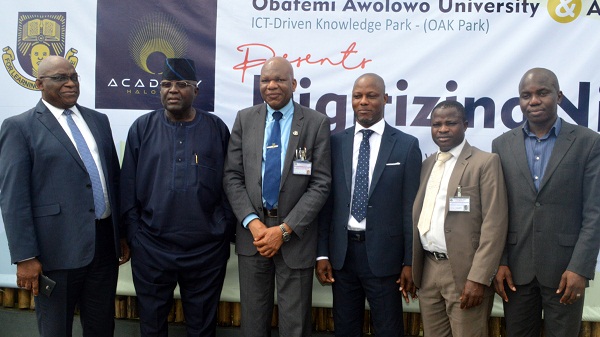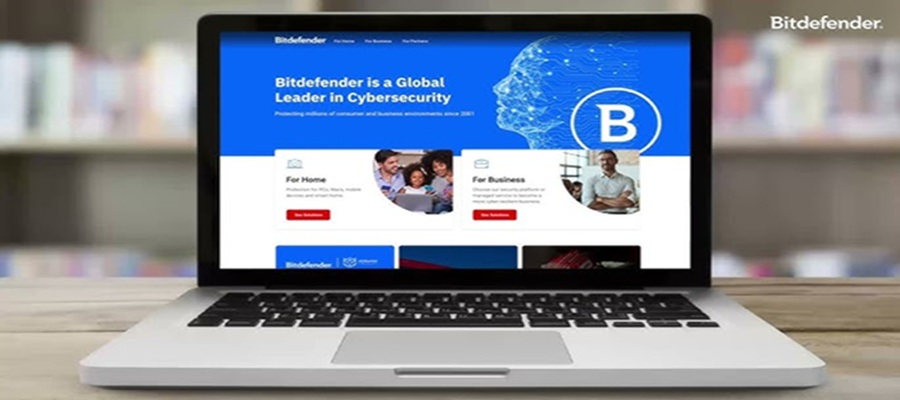Telecom
Academy Halogen Deepens Cyber Security Conversation with Digitization Confab

Academy Halogen, the Halogen School of Security Management & Technology, has emphasized the need to create a clear policy direction for Nigeria’s digital economy to facilitate effective cyber security practice.
This is because, in today’s digitized world, cyber security has become a vital component of enterprise risks solution helping organizations to deliver their bottom-line.
Dr. Wale Adeagbo, Chief Operating Officer of Academy Halogen, echoed the importance of a strong cyber security policy direction at the opening of a policy development session hosted at the Ikeja GRA, Lagos campus of the institution.
Tagged ‘Digitizing Nigeria; A meeting of Town and Gown’, the cyber security policy confab was a joint initiative of Academy Halogen and the ICT-Driven Knowledge Park of the Obafemi Awolowo University, OAU.
The Academy Halogen boss described the cyber security knowledge sharing session between industry experts and thought leaders from the academic community as a gathering meant to “trigger vital public discussion on how best to digitize Nigeria for the benefit of commerce and knowledge management”.
Professor Eyitope Ogunbodede, Vice-Chancellor of Obafemi Awolowo University, while delivering his keynote address expressed happiness on the collaboration between his University and Academy Halogen on cyber security knowledge development on one hand and plans to work with Troyka Group on other levels.
He noted that OAU now have a sustainable policy of engaging with the community and organizations within the industry towards producing graduates who are both academically sound and industry savvy.
Professor Ogunbodede further gave assurance that the cyber security learning session is a product of thoughtfulness between OAU and Academy Halogen for the good of Nigeria.
“This is an initiative we are driving together for the benefit of the entire country.
“The purpose is not about making money, the purpose is to contribute effectively towards digitizing Nigeria in the area of cyber security”, the Vice-Chancellor said.
Speaking earlier, Professor Ganiyu Aderounmu, Co-Centre Leader, OAU ICT Driven Knowledge Park noted that the institution is already bridging knowledge gap between the academic and the industry through collaboration with many corporate big players in the ICT and allied sectors for industrial knowledge transfer to graduates.
“At OAU, the ICT-Driven Knowledge Centre is already blocking the leakage of students lacking practical and industry experience.
“We have a lot of partners. We are partnering with Academy Halogen to further enhance our growing collaboration in the area of cyber security.
“We are committed to stimulating creativity and excellence in research and innovation in ICT”, Professor Aderounmu explained.
In his presentation on competencies and requirements in addressing cyber security, Professor Ndubuisi Ekekwe, a Micro Electronics and Medical Robotic Engineering expert added his scholarly perspective to the cyber security discussion and the need for a robust digital policy direction.
“The world is made up of numbers. Everything we do as humans is about numbers.
“We can reduce frictions in business by deploying right technology. Companies are moving from the physical to the digital realm.
“Digitizing Nigeria will bring about a new nexus of opportunities. Our nation will only be bounded by the limitation of the mind”, Professor Ekekwe analyzed.
Vice-Chairman Troyka Group, Mr. Jimi Awosika in a presentation tagged ‘Business and the need for safety in an open world’ observed that we now live in an open world full of risks, which requires security and intelligence to survive.
“On the part of business and society is the requirement for appreciation of the present danger of the open world and the need to invest not only in these services but more so the propagation of the knowledge that the open world presents for as they say, the panacea for the spread of any communicable disease conditions is knowledge”, he explained
In a presentation titled Enterprise Risk in Cyber, Director General, Association of Enterprise Risk Management Professionals (AERMP), Mr. Olayinka Odutola, who stood in for the Association’s President, Mrs Taiwo Ige noted that cyber security is an enterprise risk management issue: not just an information technology issue.
Other participants commented on the benefits of digitization to the private sector in terms of collaboration, the need to digitize the Nigerian populace and the lack of central data for quality policy formulation.
Academy Halogen’s policy development session is in furtherance of the Academy’s commitment to continuously raise conversation for effective enterprise security risk management and policy formulation.
The institution which is reputed to have trained about a million security personnel of various cadres in the Halogen Group’s over 25 years of existence, was formally known as Halogen School of Security Management & Technology, transforming, in a recent re-branding exercise to Academy Halogen.
Academy Halogen which offers a wide range of enterprise security risk related certificate, diploma & MBA courses in partnership with top universities like Babcock and Elizade universities, is also deeply involved in capacity development programmes in the area of enterprise security risk management for various corporations, small, medium and top businesses as well as public enterprises, government institutions and security agencies.
Telecom
Samsung Plans to Double AI Mobile Devices to 800 million Units this Year

Samsung Electronics plans to double this year the number of its mobile devices with “Galaxy AI” features largely powered by Google’s Gemini, its co-CEO said, which would give the U.S. firm an edge over rivals as the global race in artificial intelligence heats up.

The South Korean company, which had rolled out Gemini-backed AI features to about 400 million mobile products, including smartphones and tablets, by last year, plans to boost that figure to 800 million in 2026.
“We will apply AI to all products, all functions, and all services as quickly as possible,” T M Roh told Reuters in his first interview since becoming Samsung Electronics co-CEO in November.
The plan by the world’s largest backer of Google’s Android mobile platform is set to give a major boost to its developer Google, which is locked in a race with OpenAI and others to attract more consumer users to their AI model.
Samsung seeks to reclaim its lost crown from Apple in the smartphone market and fend off competition from Chinese rivals not only in mobile telephones, but televisions and home appliances, all overseen by Roh.
It will offer integrated AI services across consumer products to widen its lead over Apple in such features, though the latter was set to be the top smartphone maker last year, according to market researcher Counterpoint.
AI Race
Alphabet’s Google launched the latest version of Gemini in November, highlighting Gemini 3’s lead on several popular industry measures of AI model performance.
In response to Gemini 3, OpenAI CEO Sam Altman reportedly issued an internal “code red,” pausing non-core projects and redirecting teams to accelerate development. The ChatGPT maker launched its GPT-5.2 AI model a few weeks later.
Roh expects the adoption of AI to accelerate, as Samsung’s surveys on awareness of its Galaxy AI brand jumped to a level of 80% from about 30% in just one year.
“Even though the AI technology might seem a bit doubtful right now, within six months to a year, these technologies will become more widespread,” he said.
Telecom
MENXTT NG to pre-install Bitdefender Antivirus on all laptops from 2026

MENXTT NG, a leading technology distributor, has announced plans to bundle Bitdefender Antivirus software with all laptops sold in Nigeria starting 2026, aiming to enhance cybersecurity for consumers and businesses.

MENXTT NG
As an authorised reseller of Bitdefender, the company said the initiative would ensure devices meet global security standards right from purchase, addressing rising cyber threats in personal, educational, and corporate sectors.
Bitdefender, a globally recognised antivirus solution, offers advanced threat detection against viruses, malware, ransomware, spyware, and phishing; lightweight performance without impacting device speed; multi-layered ransomware protection; safe browsing features; and certifications from independent testing bodies.
Anthony Emeka Nwosu, Co-Founder of MENXTT NG, stated: “At MENXTT NG, we pride ourselves on offering some of the best laptops, smartphones, and gadgets in the market.
“These devices power businesses, education, and daily life, and it is only right that they are properly protected. By partnering with Bitdefender, we are ensuring our customers enjoy world-class security alongside world-class devices.”
The move, according to industry analysts, positions MENXTT NG as a solutions provider in Nigeria’s tech market, bridging global best practices with local needs amid accelerating digital adoption.
MENXTT NG described the bundling as part of its strategy to deliver complete technology solutions and build customer trust.
For enquiries: +234 814 090 2614; www.menxtt.cm.ng; [email protected].
Telecom
MTN Nigeria Crowns Ayo Benzi Winner of Next Afrobeats Star

MTN Nigeria, in collaboration with ONErpm and Ultima Studios, has announced Ayodeji Benson, popularly known as Ayo Benzi, as the winner of the maiden edition of the Next Afrobeats Star reality show.

L-R: Onyinye Ikenna-Emeka, Chief Marketing Officer, MTN Nigeria; Ayodeji Benson, Winner, Next Afrobeats Star Reality Show (Season 1) and Emamoke Ogoro, General Manager, Brand and Communication, MTN Nigeria, at the grand finale of the Next Afrobeats Star Reality Show (Season 1), held at the Ultima Studios, Lekki, Lagos on Saturday, December 13, 2025.
The grand finale, held on Sunday night at Ultima Studios in Lekki, Lagos, marked the climax of a nationwide talent search that began in September with over 15,000 aspiring musicians.
After weeks of auditions, mentorship, and rigorous training, five finalists – Ayo Benzi, Dave Cash, Kaeko, Somto O’Laker, and Lucky Yay – battled for the top prize in a high-energy showcase of performance and artistry.
At the end of the electrifying contest, Ayo Benzi emerged victorious, securing a ₦150 million music deal. Dave Cash was named first runner-up with ₦100 million, while Kaeko, Somto O’Laker, and Lucky Yay received ₦75 million, ₦50 million, and ₦25 million respectively.
Throughout the season, contestants were mentored by leading Afrobeats producers Sarz, Puffy Tee, P Prime, and Andre Vibez. Benzi, who was part of Puffy Tee’s team, credited the mentorship programme for sharpening his craft and stage presence.
Speaking at the event, Onyinye Ikenna-Emeka, Chief Marketing Officer of MTN Nigeria, said the initiative reflects the company’s commitment to youth empowerment and cultural expression.
“The Next Afrobeats Star platform is about creating real opportunities for young Nigerians and giving their talent the structure, visibility, and support it deserves.
“Afrobeats continues to place Nigeria on the global cultural map, and MTN is proud to be enabling the next generation of artists who will take this sound even further,” she said.
She added that the finale was not just a competition but a celebration of growth and readiness for the global stage.
In his acceptance speech, Ayo Benzi described the victory as a defining moment in his career.
“A big thank you to MTN. From the audition days, the treatment MTN has given us has been amazing. God bless the brand,” he said.
The finale also featured guest performances by Afrobeats stars Iyanya and Bella Shmurda, adding glamour to the night and reinforcing the show’s connection to the wider music ecosystem.
With the successful conclusion of the season, MTN Nigeria and its partners reaffirmed their role in championing youth ambition, supporting creative industries, and shaping the future of Nigerian music through platforms that turn potential into opportunity.

 News2 days ago
News2 days ago974 Nigerians Face Imminent Deportation from Canada Amid Enforcement Surge

 News24 hours ago
News24 hours agoCourt Sends Faleti, Ex-Lagos Director to Jail for Stealing ₦48.9m from Access Bank

 General News2 days ago
General News2 days agoHouse of Reps Releases Certified Copies of Tax Reform Acts amid Gazette Discrepancy Claims

 E-Financial24 hours ago
E-Financial24 hours agoRemita Powers over ₦100 Trillion in Payments as Nigeria’s Digital Economy Expands

 E-Financial24 hours ago
E-Financial24 hours agoWhy 2026 Must Be the Year Nigeria’s Economy Works for All

 E-Financial24 hours ago
E-Financial24 hours agoFlutterwave Acquires Nigeria’s Mono in $25m-$40m All-Stock Deal

 General News24 hours ago
General News24 hours agoNigeria Targets Satellite-to-Mobile Services in Draft Spectrum Roadmap

 E-Financial24 hours ago
E-Financial24 hours ago2026: SEC to Review Rules to Incentivise SME Listings











